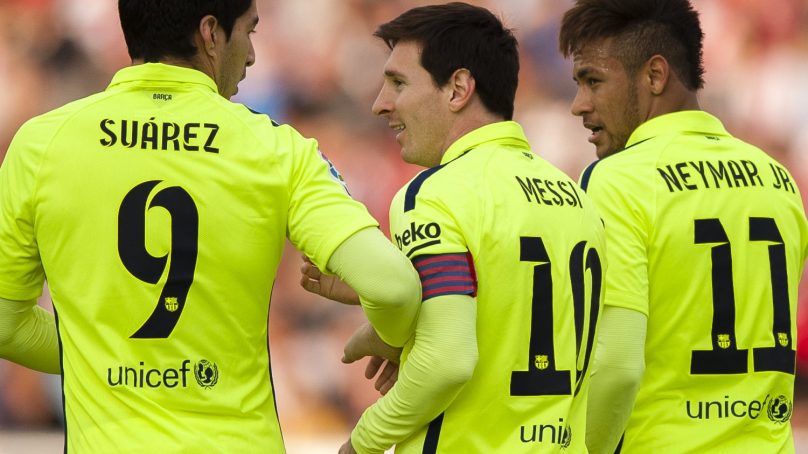
Barcelona president Joan Laporta used his customary address at the club’s ordinary general assembly last month to announce that the crisis he inherited in 2021 was over.
Record turnover, a huge profit and the “unique achievement” of six Spanish titles for the multi-talented club’s various sports teams – including, most importantly, the men’s and women’s football sides. From bust to back in two years.
“A lot of work has been done to return happiness to Barcelona fans as we have stabilised the club, which is once again a reference point in the world of sport,” the lawyer-turned-magician proclaimed.
And it is some trick Laporta, 61, has pulled off, up there with making an elephant disappear. From a world-record annual loss for a sports team of £418 million ($510 million at today’s rates) to a club-record profit of £255 million.
Despite that achievement, Barcelona are here, in our series of stories about famous clubs in varying states of financial distress. They have escaped the immediate threat of the frying pan but they are still floating somewhere between safety and the flames.
Floating is better than burning, of course, and floating can be fun when you have players as good as theirs, but Barcelona would have made a fourth straight financial loss last year – and a hefty one at that – if Laporta had not pulled his ‘palancas’, the much-lampooned ‘economic levers’ of selling future revenue streams for big, but discounted, upfront payments.
So, just like a magic show, all is not quite what it seems at Barcelona, where there is nothing customary or ordinary about the club’s finances.
How did they get into this mess?
For accountants, there is a memorable exchange in American writer Ernest Hemingway’s first novel The Sun Also Rises. One character asks another how he went bankrupt. “Two ways,” the cash-strapped chap replies. “Gradually then suddenly.”
Barcelona can empathise.
Trying to pin down exactly when “gradually” started for the Catalans is difficult but if you are searching for culprits, the summer of 2017 has a very guilty look on its face. That was when Neymar shocked everyone by leaving.
The Brazilian had arrived at the Camp Nou four years previously in a move that ticks almost every box on the Barca bingo card: the hottest new talent on the block, huge fee, allegations of tax fraud (of which he was later cleared and his father called “unfounded accusations”). Adding him to a team that was already in the conversation for the greatest of all time seemed unfair and that is how it played out in 2015 and 2016, when Barca won almost every competition they entered.
Neymar, as one-third of the ‘MSN’ forward line alongside Lionel Messi and Luis Suarez, made a full and, at times, under-appreciated contribution. But 2017 did not go quite as well as the previous two campaigns, as Barcelona followed the Neymar-inspired miracle of a 6-1 second-leg victory over Paris Saint-Germain in the Champions League by losing 3-0 to Juventus in the next round. They would also finish second to Real Madrid in the league, which means they came last in that particular two-horse race.
For the man himself, however, perhaps the biggest disappointment came the previous December, when he finished fifth in the voting for the Ballon d’Or, a prize given to the player a panel of international journalists believes is the best on the planet. Having been third in 2014, Neymar was going backwards, and he was beaten in 2016 by team-mates Messi and Suarez.
So, when PSG, bankrolled by Qatari state wealth, agreed to pay Neymar’s €222 million (£193 million) release clause and give him a fresh canvas on which to paint his Ballon d’Or entry, the band was abruptly broken up.
Still, there was the consolation of the enormous transfer fee, right?
Yes… but Barcelona wasted it. And while they are hardly the first – or last – club to make expensive recruitment mistakes, there was an inevitability about it. Barcelona are particularly vulnerable to profligacy in this area due to the nature of who and what they are: a vibrant but fickle democracy.
The club is owned by its 150,000 card-carrying members, who pay about £180 a year for the right to buy cheaper tickets and vote on who should run Barcelona. That bit is done by a far smaller group of members who are rich enough to afford the personal bank guarantees required to run for office.
But once these guys have earned or inherited enough money to be a Barca director, or even president, they have to convince the other members they are going to bring the good times back/keep them rolling, which usually involves promising to sign superstars. Just like real politicians and tax cuts/spending promises, then.
The upshot of all this democracy is that decision-making at Barca can often be scatter-gun, short-term and self-serving. And the decision-makers can be hard-working and successful in their day jobs but hopelessly ill-equipped when it comes to running a football club. Josep Maria Bartomeu, the president between 2014 and 2020, is a good embodiment of these flaws in the Barca model.
We are skipping a few steps in this slow-motion car crash but Barca basically swapped Neymar for French winger Ousmane Dembele, who had just enjoyed a promising season with Borussia Dortmund, and Brazilian midfielder Philippe Coutinho, who had spent five years with Liverpool. Unfortunately, neither of these signings worked out, and they cost Barca about £70 million more than they received for Neymar.
The impact of these (and several other) misfires in the transfer market was not immediately obvious, though. Barca won a domestic double in 2018 and retained the league title in 2019. But some dramatic defeats in the Champions League, most notably a 4-0 loss at Liverpool in 2019, suggested the team was in decline, despite the continued excellence of Messi.
But, in the tradition of great tragedies, even Messi was becoming a problem. Not the man or the player, but his cost. Since every board member knew that losing the totemic Argentinian to another club would ensure a vote of no confidence, they said ‘si’ to whatever Messi’s representatives thought their man was worth. Between 2014 and 2020, that figure tripled.
In January 2021, Spanish newspaper El Mundo revealed Barca had paid Messi €555 million over four years from 2017. He might have been worth it but every time he got a raise, the rest of the dressing room would want more, too. In 2017, the football club’s wage bill was £296 million. A year later, it was £425 million and it went up again in 2019 to £437 million.
The irony for Messi is his huge salary meant the club could not make a serious attempt to bring Neymar back when he might have been available in 2019, and made no effort to keep Suarez in 2020. To make matters worse, the board appeared to be forcing out players it could no longer afford.
So, that’s the “gradually” part of the equation at Barcelona. The “suddenly” moment was the arrival of Covid-19 in March 2020.
The pandemic hurt every football club but it almost killed Barcelona. Being forced to close the gates at Camp Nou deprived the club of the largest matchday revenues in Spain. But the club does not just own Europe’s largest club stadium, it also runs one of Spain’s most popular tourist attractions — its museum and stadium tour. And all that footfall usually means they sell lots of merchandise, too.
The pandemic also hit a third revenue stream, as it depressed the entire transfer market at exactly the moment Barca had an entire team of expensively assembled and well-remunerated recruits to offload.
Altogether, Barcelona estimates Covid-19 cost them nearly £400 million in lost revenue in the 2020 and 2021 financial years, which goes a long way to explaining the disastrous accounts they posted, losing a total of £442 million.
No club – even one that topped Deloitte’s Money League, a ranking of football clubs’ revenues, in January 2020, three months before the pandemic struck, when Barca became the first club to earn more than €800 million (£698 million) in a season – can take a punch like that and not hit the canvas.
How bad is it?
OK, you get the idea. Barca were in trouble. But, to continue the boxing metaphor, were they dazed and blowing hard, or unable to defend themselves?
- The Athletic report











